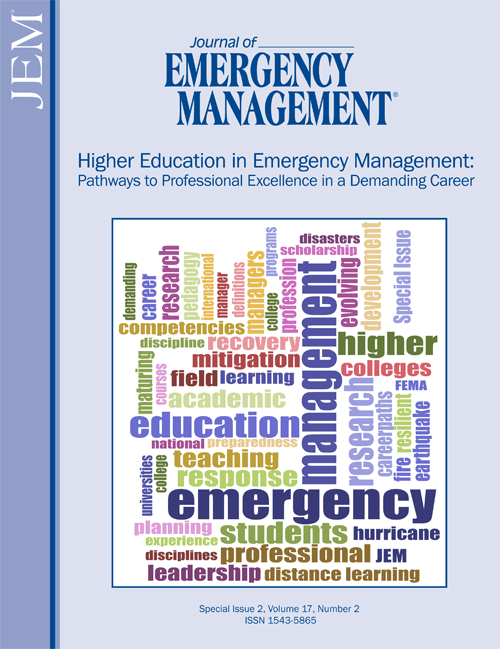The development of Emergency Management and Homeland Security Degree program at historically black colleges and universities: The case of Texas Southern University, Houston, Texas
DOI:
https://doi.org/10.5055/jem.2019.0406Keywords:
emergency management higher education, FEMA, minorities in emergency managementAbstract
This article shares the experience of establishing the Emergency Management and Homeland Security degree program at Texas Southern University (TSU), Houston, Texas. Emergency management programs are evolving and keep increasing and the nature of jobs of emergency managers are becoming more complex. Consequently, there is increasing need to have minority emergency managers who would be able to relate directly with other minorities impacted by disasters. This study uses the case of TSU to discuss the challenges and successes of developing a fairly unknown program at a historically black college and university and how the obstacles were overcome. It further discusses the process of the degree program development, the curriculum, and the present state of the program. This article concludes there are many advantages in training emergency managers of color in the field. These would be professionals in the field with the added advantage of being people of color. They would understand planning for and responding to those affected because they most likely have the same background and similar experience. Additionally, the developer of any new program should expect some form of opposition from faculty, staff, and administration but once central administration buys in, the program is worth the while.
References
Bundy S: Emergency Management at HBCUs and Minority-Serving Institutions: Best Practices and Challenges – Session Overview at the 15th Annual Federal Emergency Management Agency Higher Education Conference. June 4-7, 2009; Emmitsburg, MD.
Neal DM: Developing degree programs in disaster management: Some reflections and observations, feedback from the field. Int J Mass Emerg Disasters. 2000; 18(3): 417-437.
Olonilua O, Ibitayo O: An in-depth analysis of the Houston-Galveston area council regional hazard mitigation plan under the Disaster Mitigation Act of 2000 (DMA2K). J Risks Hazards Crisis Public Policy. 2014; 5(3): 316-341.
McEntire DA: Foreseeing the Future, Revisiting the Past: The Historical Development and Progress of the Emergency Administration and Planning Program, White Paper. Emmitsburg, MD: Federal Emergency Management Agency, 2004. Available at http://training.fema.gov/EMIWeb/edu/highpapers.asp. Accessed June 28, 2017.
McEntire DA: Nourishing an Academic Degree: Promoting Growth in Emergency Administration and Planning at the University of North Texas, White Paper. Emmitsburg, MD: Federal Emergency Management Agency, 2006. Available at http://training.fema.gov/EMIWeb/edu/highpapers.asp. Accessed June 28, 2017.
Klenow DJ, Youngs GA: Developing and enhancing emergency management programs at the undergraduate level, in Hubbard Jessica (2010) integrating emergency management studies into higher education: Ideas, programs, and strategies. Papers from the 2009 FEMA Emergency Management Higher Education Conference. Vol. 1. Emmitsburg, MD: The Public Entity Risk Institute, 2010.
Kapucu N: Developing competency-based emergency management degree programs in public affairs and administration. J Public Aff Educ. 2011; 17(4): 501-521.
Kiltz L: Developing critical thinking skills in homeland security and emergency management courses. J Homel Secur Emerg Manag. 2009; 6(1): Article 36.
Federal Emergency Management Agency: FEMA Emergency Management Institute 2017. Available at https://training.fema.gov/emi.aspx. Accessed December 17, 2017.
Olonilua O, Ibitayo O: Toward multihazard mitigation: An evaluation of FEMA-approved hazard mitigation plans under the Disaster Mitigation Act of 2000. J Emerg Manag. 2011; 9(1): 37-49.
Archibald P, Estreet A: Utilization of the interprofessional education, practice, and research model in HBCU social work education. J Hum Behav Soc Environ. 2017; 27(5); Teaching, Research, and Practice: The HBCU (historically black colleges and universities) Perspective, Published online: March 8, 2017.
Shorette CR II, Palmer RT: Historically black colleges and universities (HBCUs): Critical facilitators of non-cognitive skills for black males. West J Black Stud. 2015; 39(1): 18-21.
Fryer R, Greenstone M: The causes and consequences of attending historically black colleges and universities. Am Econ J Appl Econ. 2010; 2(1): 116-148.
Roebuck JB, Murty KS: Historically Black Colleges and Universities: Their Place in Higher Education. Westport, CT: Praeger Publishers, 1993.
Kim MM: Historically black vs. white institutions: Academic development among black students. Rev High Educ. 2002; 45: 385-407.
Kim MM, Conrad CF: The impact of historically black colleges and universities on the academic success of African American students. Res High Educ. 2006; 47(4): 399-427.
Palmer RT, Gasman M: “It takes a village to raise a child”; The role of social capital in promoting academic success for African American men at a black college. J Coll Stud Dev. 2008; 49(1): 52-70.
Bristow M: Subjective well-being of African American students attending historically black colleges and universities and predominantly white universities: A qualitative research report. 2002. XULUne XUS.
Morse L, Sakano R, Price GN: Black public colleges and universities as projects: How do they rank relative to white public colleges and universities? Rev Black Polit Econ. 1996; 24(4): 65; ABI/INFORM Collection.
Hale F: How Black Colleges Empower Black Students: Lessons for Higher Education. Sterling, VA: Stylus Publishing, 2006; Hawkins v. Board of Control, 350 U.S. 413 (1950).
Thomas M, Hilton AA: The relevance of historically black colleges and universities: An exploration of the affect of campus climate on student success. NASAP J. 2011; 14(1): 19-33.
Texas Southern University: Homepage/About Us. Texas Southern University Web site. Available at www.tsu.edu. Accessed March 17, 2018.
Inside: Fall 2013 issue of Inside, The Magazine of Texas Southern University.
Published
How to Cite
Issue
Section
License
Copyright 2007-2025, Weston Medical Publishing, LLC and Journal of Emergency Management. All Rights Reserved.
Leave Nobody Behind: Emergency Management in a More Inclusive Way is a trademark of Journal of Emergency Management






